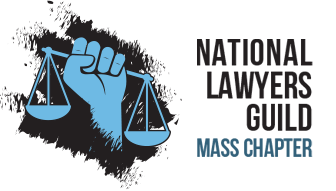On Thursday, November 8th, at 6:00pm, the NLG-Mass Chapter presented the third Know Your Rights teach-in of our six-month long series, “Law For The People.” Harvard University Law School co-sponsored and hosted this teach-in, called “Housing Law For The People.”
Speakers and long-time NLG attorneys Nadine Cohen, Jeff Feuer, and Lee Goldstein gave an incredibly informative and inspiring lecture.
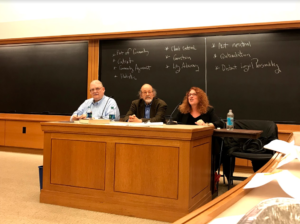
Attorney Cohen is the Managing Attorney of the Consumer Rights Unit at Greater Boston Legal Services (GBLS). A prominent civil rights attorney and a nationally-known expert of fair housing issues, Cohen continues to combat injustices such as foreclosure, credit discrimination, and predatory lending.
Attorneys Feuer and Goldstein of Goldstein & Feuer law office have been dedicated to a progressive community-based law practice since 1995. Primarily working in landlord/tenant affairs, Feuer and Goldstein pride themselves in being sensitive to the concerns of the communities in which they live and work, and in understanding the role of the law in the wider context of the political and economic issues with which we all struggle.
Feuer is currently the chair of NLG-Mass’s Mass Defense Committee, and is very active in NLG-Mass’s Street Law clinics. Goldstein was the President of NLG-Mass in the 1980s, and today continues to be an exemplary NLG-Mass lawyer dedicated to the cause.
In the Housing Law For The People teach-in, Feuer articulated the role and responsibilities of community lawyers. “As community lawyers, we’re fighting for housing as a fundamental right…[fair housing] is part of the United Nation’s Universal Declaration of Human Rights, but it is not provided by the US Constitution.” In this fight, community lawyers must collaborate with tenant organizers who have boots on the ground and thus deeply understand the struggle of the communities most often subjected to housing discrimination, poor living conditions, and systemic exploitation.
Feuer explained the “sword and shield” strategy for protecting individuals from evictions and foreclosures: lawyers assist in lobbying politicians and institutions such as banks to create better housing policies and lending practices; in civil disobedience such as eviction blockades by representing dissenters in cases of arrest; and in canvassing at-risk neighborhoods in Know Your Rights campaigns. While Feuer stated that “[community] lawyers are an integral part of protecting and prescribing affordable housing,” he also stressed that “we[, the lawyers,] are not the vanguard! We are led by activists and organizers and members of these communities.”
In answering the question of how a community lawyer makes a sustainable living, Feuer unpacked a number of Massachusetts policies that ensure that housing attorneys get paid by landlords who get caught and persecuted in court for unjust housing violations, rather than by the low-income tenants who suffered such unjust housing conditions.
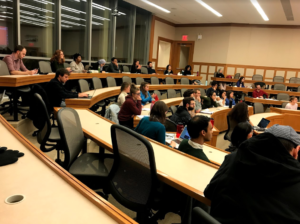
Next in the panel, Cohen discussed how housing discriminatory practices especially targets women of color and low-income women.
Most housing discrimination is against women seeking housing provided by Section 8. If a woman has children (especially if the woman is a single parent); if a woman has a history of being abused; or if a woman is of color (especially if the woman is an immigrant), it is common for Section 8 housing authorities to reject her housing application.
Even in cases of these women acquiring housing, they still suffer disgusting and inhumane living conditions. One in every ten low-income women are sexually harassed by their landlords through lewd comments, home invasions, and demands for sex services as rent payment. Black women in Section 8 housing suffer 35% more discrimination and violence than white women in Section 8 housing. To this regard, Cohen quoted an article from The Washington Post: “Eviction is to Black women as incarceration is to Black men. ‘Poor Black men are locked up while poor Black women are locked out.'”
“We need to be involved with groups like the NLG to connect us with the people in these communities,” Cohen said.
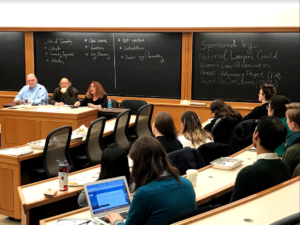
To this regard of collaborating with community activists and organizers in order to protect tenants (especially those most often discriminated against), Goldstein also mentioned that “judges do not make decisions [regarding housing cases] in a vacuum. Lawyers play a part, but there needs to be an awareness of the culture [around housing] and of what’s on the ground.”
“We need to use laws as best as possible to protect tenants,” said Goldstein, “– and sometimes, not use laws at all.”
Special thanks to the co-sponsors of this event: Women’s Law Association, Tenant Advocacy Project (TAP), and Project No One Leaves (PNOL)!
– Kayla Degala-Paraíso –


